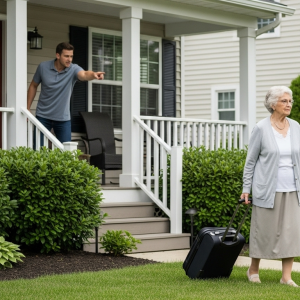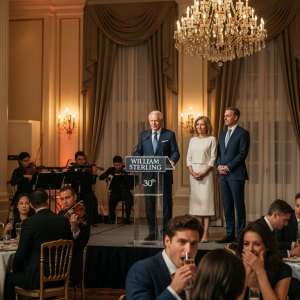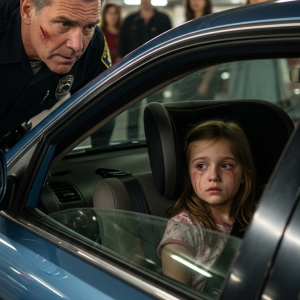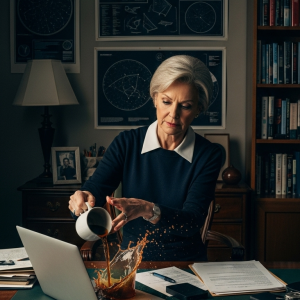The old house felt different lately, its familiar silence replaced by a tense, waiting stillness. For Susan, it was the sound of her own home holding its breath. She would watch her daughter, Chloe, from the corner of her eye, seeing not the girl she raised, but a stranger shaped by another’s influence.
That influence had a name: Dylan. He had entered their lives six months prior, all charming smiles and easy confidence. Now, his presence was a permanent fixture on their floral sofa, his voice a constant, low murmur in Chloe’s ear. Susan could almost hear the words he was planting like toxic seeds in her daughter’s mind.
“It’s your house, Chloe. Your birthright,” he’d say, his arm draped possessively around her. “The law is on our side. Why should we wait? Your father would have wanted you to be happy, to start your life.”
Chloe, who once spoke of her father’s memory with love and respect, now used it as a weapon. She had become distant, her conversations with Susan clipped and transactional. Every discussion about the future ended with a veiled reference to the house, to her “rights,” and to the inconvenience of the current living arrangement.
One evening, Susan tried to breach the growing chasm between them. “Chloe, darling, can we talk? I’m worried about you. About… all this pressure you’re under.”
Chloe didn’t look up from her phone, her thumb scrolling endlessly. “I’m fine, Mom. Just thinking about the future.” Dylan, sitting beside her, gave a slight, almost imperceptible nod.
“Your father and I,” Susan began, her voice soft, “we made this will to protect you. To give you a stable foundation when you were ready to build your own family.”
“And I am ready!” Chloe snapped, finally looking up. “Dylan and I are serious. Are you saying you don’t approve? That you want to stand in the way of my happiness?” The words were Chloe’s, but the venom belonged to Dylan. He watched the exchange with a satisfied smirk.
The memory of her husband, Tom, was a comforting warmth Susan often turned to in these cold, new days. She remembered the day they signed the will, sitting across from their lawyer, Mr. Harrison. Tom had tapped his finger on one particular clause.
“This one is important,” he had said, his gaze finding hers. “I’m putting this clause in to protect you, Susan. To protect you from our daughter’s own youthful foolishness. She’s a good girl, but she needs to learn that family is built on respect, not on demand.”
His words echoed in her mind now, a painful premonition that had become her reality. The will was clear: Susan had the right to live in the house until her passing, or until Chloe married, at which point ownership would transfer. But Chloe and Dylan had twisted its meaning, choosing to believe they could seize control early.
The final confrontation came on a Tuesday night. Chloe approached Susan in the living room, her posture stiff, her eyes avoiding her mother’s. Dylan stood just behind her, a silent puppeteer.
“Mom, I love you,” Chloe began, her voice a rehearsed monotone. “But Dylan and I need our own space to build our future. This is my house too, after all. We think it would be best if you went to stay with Aunt Carol for a while.”
Silence descended upon the room, thick and heavy. Susan looked past her daughter, her eyes locking onto Dylan’s triumphant gaze. Then, she looked back at Chloe, searching for a flicker of the child she knew, but found none. There was no argument left to be had, no plea that hadn’t already been ignored.
With a profound and weary sadness, Susan gave a single, slow nod. “Alright, Chloe. If that’s what you truly want.” Without another word, she walked upstairs. Chloe watched, a brief flash of doubt crossing her face before Dylan squeezed her shoulder, whispering, “You did the right thing. It’s for the best.”
Minutes later, Susan descended the stairs carrying a small overnight bag, containing only a few essentials. She walked to the front door, pausing with her hand on the knob. She didn’t look back as she stepped out into the night, closing the door softly behind her, leaving her daughter in the house she had just forfeited.
The Inheritance You Just Threw Away.
The next morning, at precisely nine o’clock, Chloe and Dylan were celebrating in their “new” kitchen. Sunlight poured in, and for a moment, it felt like a victory. They were mapping out which walls to repaint when the doorbell rang, sharp and intrusive.
Chloe opened the door to a chilling sight. Mr. Harrison, their family lawyer, stood on the porch, his face grim and unreadable. Flanking him were two uniformed police officers, their presence an immediate and terrifying sign that this was not a social call.
“Mr. Harrison? What’s going on?” Chloe asked, her voice trembling slightly.
“Miss Evans,” the lawyer stated, his tone cold and formal as he stepped inside. “I am here on behalf of the estate of your late father, and in representation of your mother, Susan Evans.” He handed her a sealed, official-looking letter.
He didn’t wait for her to open it. “According to the last will and testament of Thomas Evans, your mother is the sole legal resident of this property. Your demand for her to vacate the premises last night constitutes an act of illegal eviction.”
Chloe’s heart hammered against her ribs. “What? No! The house is mine when I get married! We were just getting a head start…”
“Furthermore,” Mr. Harrison continued, his voice cutting through her panicked explanation, “that very action has triggered the penalty clause within the will.” He paused, letting the weight of his next words land with devastating force.
“Your inheritance rights to this property have now been permanently and irrevocably voided. You have one hour to collect your personal belongings and vacate the premises before the property is sealed and its ownership transferred to the Thomas Evans Charitable Foundation.”

The world tilted on its axis. The sunlight in the kitchen no longer felt warm, but harsh and exposing. Chloe stared at the lawyer, then at Dylan, whose face had turned a sickly pale. The house wasn’t theirs. It was never going to be theirs. In a single, selfish act, she had lost everything.
The destruction was swift and total. The hour they were given was a blur of frantic packing under the stoic, watchful eyes of the police. The home she had so arrogantly claimed was reduced to a collection of boxes in the driveway.
Once they were on the curb, surrounded by their hastily gathered possessions, Dylan’s true nature erupted. The charming facade crumbled, replaced by pure, uncut rage.
“You idiot!” he hissed, his face contorted. “I told you the law was on our side! You must have said it wrong! How could you be so stupid as to get kicked out of your own house?” He wasn’t a partner in this; he was a parasite furious that its host had been cast out.
“Me?” Chloe cried, tears streaming down her face. “You’re the one who pushed me! You told me to do it!”
“I told you to be smart, not to get us thrown out on the street!” he spat back. With that, he grabbed his own bags, threw them into his car, and drove away, leaving Chloe alone on the sidewalk amidst the ruins of her life.
In the following months, Chloe’s world shrank to the size of a cramped, rented room. The illusion of her entitlement had been shattered, replaced by the harsh reality of low-wage jobs and mounting bills. She was not only homeless; she was stripped of her family, her future, and her identity. The silence in her tiny room was louder than any argument, filled with the echo of her father’s disappointment and her mother’s quiet departure.
After months of surviving on a diet of regret and instant noodles, Chloe finally found the courage to face what she had done. She appeared on her mother’s doorstep, not as a claimant, but as a penitent. She was thinner, her eyes shadowed with exhaustion, the arrogance completely gone.
Susan opened the door and saw not the stranger who had evicted her, but the ghost of the daughter she loved. Chloe broke down, her apology a torrent of choked sobs and genuine remorse. She asked for nothing but forgiveness.
Susan, her heart aching with a mother’s love, did not turn her away. “You can come home, Chloe,” she said, her voice firm but gentle. “But things will be different now. This is my home. You will live here as my guest, with my rules. Respect is the rent you will pay.”
Their relationship began to heal, slowly and carefully, built this time not on assumption, but on mutual understanding. Susan contacted the charitable foundation, explaining the situation. She arranged a legal agreement: she would live in the home as a life tenant, and upon her passing, the property would be donated as her husband had intended.
Susan had not just reclaimed her house; she had given her daughter the chance to earn back her place in it. She had won the opportunity to teach Chloe the most important lesson of all: that a family’s legacy is not a thing you can seize, but a gift you must be worthy of receiving.
Of course. Here is the continuation of the story, written in English.
The first few weeks of Chloe’s return were like walking on thin ice. The house, once a battleground of entitlement, now felt like a monastery of silence and penance. There was no list of rules taped to the refrigerator, but they existed in the air, heavy and absolute.
The first rule was contribution. Chloe woke up at 5 a.m. every day to work a shift at a small café. It was grueling, low-wage work, smelling of burnt coffee and impatient customers. But every dollar she earned was a brick in the rebuilding of her self-respect. At the end of each week, she would place a portion of her modest earnings on the kitchen table for Susan.
Susan never counted the money. She would simply nod, a solemn acknowledgment of her daughter’s effort. The act wasn’t about finances; it was a ritual. It symbolized that Chloe was no longer an heir-in-waiting, but a tenant, a contributing member of the household.
The second rule was responsibility. Chores that Chloe had once ignored now became her routine. She cleaned the kitchen after dinner, did the laundry, and tended to the small, neglected garden in the backyard. The hands that were once accustomed only to a phone screen grew calloused from soil and dishwater.
Susan observed all of this from a distance. She offered no praise, nor did she criticize. Her silence was a test, a space for Chloe to prove that her change was genuine, not just a performance to win back favor. Occasionally, while Chloe was pulling weeds, her mother would bring her a glass of lemonade. No words were exchanged, but in that simple gesture, a tiny bridge was built across the chasm between them.
One rainy Sunday afternoon, Susan suggested they clean out Tom’s study, which had been kept shut since his passing. The air inside was heavy with the scent of memory, of dusty books and old photographs.
While sorting through a stack of old papers, Chloe found a small, leather-bound notebook. It was her father’s journal. Her hands trembled as she opened it. Most of the entries were thoughts on work and life, but one near the end made her breath catch in her throat.
It was dated just a few weeks before he died. “Spoke with Chloe today about her future. She is a bright girl, but her heart is clouded by a sense of entitlement. I worry she sees our legacy as a prize, not a responsibility. Susan and I have put a clause in the will. I pray it is never triggered, but I must protect the woman I love from our daughter’s own foolishness. May she learn the lesson of respect before it is too late.”
Tears streamed down Chloe’s face as she read the words. It was not an indictment, but the painful prophecy of a loving father. She passed the journal to her mother. Susan read it, and for the first time in months, she pulled her daughter into a full embrace.
“I’m so sorry,” Chloe sobbed into her mother’s shoulder. “I failed him. I failed you.”
“Your father was never disappointed in you, he was worried for you,” Susan whispered, stroking her daughter’s hair. “And he was right. You had to learn a lesson the hard way. But you’ve learned it. That’s what matters.” In the dusty room of the man they had both lost, the two women finally began to truly heal.
Chloe’s growth faced an unexpected test a few weeks later. As she was walking home from her shift, a familiar voice called her name. “Chloe! Wait up!”
It was Dylan. He looked more disheveled than she remembered, his expensive shirt wrinkled. His trademark smirk was still there, but it couldn’t hide the desperation in his eyes.
“I’ve been looking for you,” he said, laying on the charm. “I was an idiot. I panicked. Can you forgive me? I heard your mom took you back in. See? I told you it would all work out.”
The old Chloe might have melted at the easy apology. But the new Chloe saw only a parasite looking for a free meal and a comfortable place to live. She looked him directly in the eye, her voice calm and steady.
“No, Dylan. It didn’t ‘work out.’ You didn’t tell me it would be okay. You told me the house was mine, that I was entitled to it. You were wrong.”
Dylan’s charm vanished. “Hey, I was just trying to help.”
“You weren’t helping me,” Chloe said, each word a truth she had paid dearly to learn. “You helped me destroy my own life. Now if you’ll excuse me, I have to get home.”
She turned and walked away, not once looking back. She felt no anger, no heartbreak. She felt… nothing. He was a closed chapter in her life, a lesson learned the hard way. Her steps felt lighter as she walked toward the house on the hill.
When Chloe told her mother about the encounter, Susan simply listened, offering no judgment. When Chloe was finished, Susan put down her teacup and smiled a genuine, radiant smile for the first time in over a year.
“Your father would have been so proud of you today,” she said simply.
That evening, they ate dinner together. The silence between them was no longer awkward or tense. It was a comfortable silence, filled with a shared understanding. The house was no longer a property to be won; it was a home once more.
Chloe knew she would never own this house. Her father’s legacy, in the material sense, was lost forever. But as she watched her mother laugh across the dinner table, she realized she had received a different inheritance, one far more valuable.
It was the legacy of forgiveness, the strength of humility, and the knowledge that a person’s worth isn’t in what they are given, but in what they build from the broken pieces. The future was unwritten, but for the first time in her life, Chloe felt ready to hold the pen.




